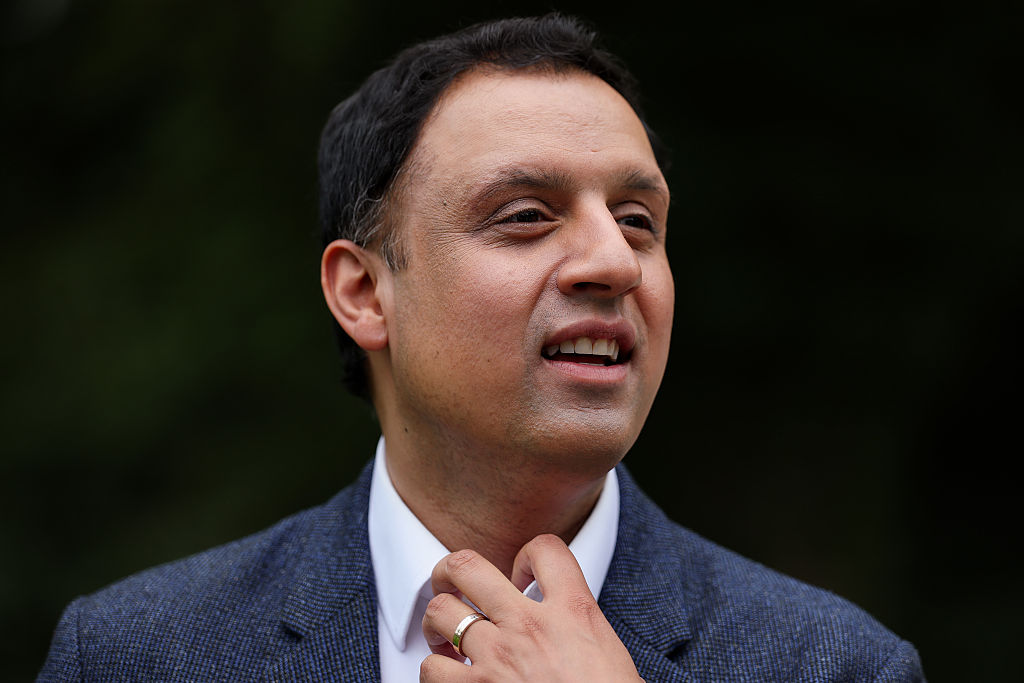The first clue that Scottish Labour might not be dead in the water came with a soundtrack by Mark Ronson and Bruno Mars. Campaigning for the 2021 Holyrood Election, party leader Anas Sarwar joined an open-air dance class in the town of Livingston and – throwing all dignity to the wind – joined in. Then, just weeks into the job of leading what seemed to be a party in constant decline, Sarwar displayed some passable moves to the hit single ‘Uptown Funk’. A clip of the scene quickly went viral.
Young, energetic and likeable, Sarwar showed himself a good sport and that counted for a lot. Over the preceding years, as the SNP rose to political dominance at Holyrood, Scottish Labour politicians had grown accustomed to being treated with, at best, derision in the streets. As the party struggled to connect with voters, it burned through leaders. When he was elected to replace Richard Leonard in 2021, Sarwar became the 11th person (including three caretakers) to head up Scottish Labour since the SNP’s first Holyrood election victory in 2007.
As the Labour party prepares to meet for its annual conference in Liverpool, the picture is very different indeed. Sarwar’s mojo appears to have deserted him.
That clip of Sarwar shaking his moneymaker in a West Lothian car park did more to improve the party’s fortunes than any number of policy proposals. The Scottish Labour revealed himself to be a good vibes kinda guy. Aided by chaos in the SNP caused by the resignation in 2023 of First Minister Nicola Sturgeon, Sarwar built on that early popularity and it soon became apparent that he had a real chance of leading his party to victory in the 2026 Scottish parliamentary election. Polls showed Scottish Labour closing in fast on the nationalists. Some suggested Sarwar was front-runner to become the next First Minister.
As the Labour party prepares to meet for its annual conference in Liverpool, the picture is very different indeed. Scottish Labour is 17 points behind the SNP and Sarwar’s mojo appears to have deserted him. This has not gone unnoticed among colleagues who fear the ship cannot be turned around before next May and the SNP will score a fifth consecutive election victory.
Where did it all go wrong? Some of Sarwar’s colleagues are quite clear: the fault lies with Sir Keir Starmer. A series of decisions, such as the announcement by by the Prime Minister last year that his Government would scrap the Winter Fuel Allowance (a partial U-turn has already taken place), played very badly in Scotland and Sarwar, say colleagues, was left hanging out to dry.
One ally says: ‘Anas worked his socks off. He did everything that was asked of him and more to get the party back in shape but when Starmer won the election, he didn’t think about Scotland and how policies would play up here.’ It’s undoubtedly true that decisions made by the UK Government have gone down badly in Scotland (as they have elsewhere in the UK) but this is a problem that – as one Labour MSP points out – the party has struggled with for years:
We’ve always been vulnerable to the attack from the Nats that we’re a branch office of the UK party so it was up to Anas to change that narrative. He could have said he disagreed with Starmer and pointed out the whole point of devolution was to find Scottish solutions for Scottish problems. He should be clear that we can take a different approach to things in Scotland without it showing some kind of split in the party.
A fellow Labour MSP suggests that’s naive: ‘If anyone thinks Anas could take a wildly contradictory position to Starmer on any subject without the SNP having an absolute field day, they’re off their heads. It’s Starmer who needs to try harder, not Anas.’
At least year’s general election, Labour won 37 of Scotland’s 57 Westminster constituencies, a marked improvement on its previous tally on one seat. Meanwhile, John Swinney’s SNP lost 39 seats, returning just nine MPs. The claim frequently-repeated by Labour politicians, that the route to Downing Street passes through Scotland is not without substance.
But while Anas Sarwar has found himself hamstrung by decisions made by Sir Keir Starmer, he has made his own unforced errors, particularly when it comes to the matter of women’s rights. When MSPs voted in December 2022 in favour of reforming the gender reform to allow anyone to self-identify into the legally-recognised sex of their choosing, Sarwar whipped his members to back the plan. He ignored the warnings of female colleagues that the move would undermine women’s sex-based rights and – without considering the implications of the new law – forced Labour MSPs to line up with the SNP. Within weeks, the public backlash to this unpopular legislation had helped Sturgeon decide her time in power had come to an end.
Earlier this year, as nurse Sandie Peggie began her ongoing tribunal claim of discrimination and harassment against NHS Fife and trans-identifying doctor Beth Upton, Sarwar attempted to get himself out the hole he’d dug. If, he said, he had known in 2022 what he now knew about gender reforms, Labour would not have backed them. Unsurprisingly, this did nothing but irritate the women who’d told him, over and over and over, that allowing men into women’s safe spaces was a very bad idea. In attempting to get himself and his party back on track with public opinion, Sarwar made enemies of both trans activists and gender critical feminists. No small feat.
One – still loyal – colleague says Sarwar needs to get back on top of the gender issue before the Holyrood election campaign begins next year: ‘He needs to apologise to the women who told him he was wrong and not worry about the backlash from trans activists. The feminists will forgive him and welcome him. It’s frustrating that he won’t reach out to them.’ A Scottish Labour grandee suggests Sarwar made a mess of the gender issue because he didn’t think about it ‘at all’:
He just went with what seemed to be the consensus without listening to the arguments against or considering the implications. He might have changed the party’s position on the Gender Recognition Act but I don’t think you could say he’s change his view because he never took the time to take a view.
Sarwar remains secure in position. He may have lost whatever it was that made him the first credible challenger to become first minister that Labour had produced in years but there are no brighter sparks in the parliamentary group ready to revive what appear to be the party’s dwindling fortunes. Just a blink-of-an-eye ago, Sarwar was dancing on a wave of popularity. Today, he’s on course to be just latest in a growing list of Scottish election losers.








Comments